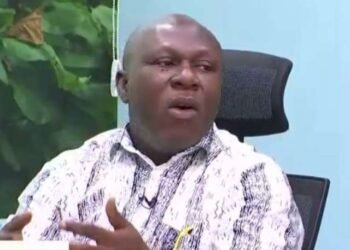Kwesi Pratt Jnr. has lambasted both the ruling National Democratic Congress (NDC) and the opposition New Patriotic Party (NPP) for what he calls a pointless and insensitive politicisation of Ghana’s ongoing power outages.
Speaking with marked frustration, the veteran journalist and managing editor of the Insight newspaper condemned the ongoing back-and-forth between the two dominant political parties over the nature and definition of the crisis, questioning its relevance to ordinary Ghanaians.
“You guys should just stop wasting our time, just stop wasting our time – with this semantic battle sometimes, and who said this and how did he say it and so on and so forth – it’s all useless as far as I’m concerned”
Kwesi Pratt Jnr, Political Analyst
The outspoken analyst noted that the power supply problem predates the current government and persisted during the final months of the NPP administration. He criticised both parties for engaging in what he described as “useless politicking,” ignoring the toll that erratic electricity supply is taking on everyday lives.
According to Pratt, the problems associated with ‘dumsor’ – a term popularly used to describe persistent power outages in Ghana have remained unchanged under both administrations.
He lamented further the rampant power interruptions that have lasted since the last year of the NPP government, and have continued unabated into the NDC administration under President John Dramani Mahama.

“And sometimes I wonder, I mean these guys (NPP) looked us in the face and said, ‘oh, it is not dumsor.’ Do we care whether it is dumsor or you call it by another name? The point is that we are suffering power outages. That’s the point – you understand?”
Kwesi Pratt Jnr, Political Analyst
He went on to criticise NPP officials for previously claiming that the country was experiencing “dum sie sie” instead of “dumsor,” ridiculing their attempts at reframing the crisis to score political points rather than addressing the menace.
In a pointed reference to recent public commentary by officials under the NDC government, he expressed deep disappointment in what he sees as a repetition of the same behaviour.
“I was reading through the newspapers and so on and some officials of the Electricity Company of Ghana were telling us that ‘we don’t have dumsor.’ I said, is this not exactly what the NPP was telling us? Do we care what you call it? We don’t”
Kwesi Pratt Jnr, Political Analyst
Real People Suffering
Pratt’s concerns extended beyond semantics and political deflections. He focused sharply on the human cost of the crisis, painting a vivid picture of the suffering endured by millions of Ghanaians whose lives are tied directly to consistent electricity.

“Think about them. Think about the many poor people who buy food and stock in their freezers and fridges, so that they can cope with this increasing cost of food and so on. Think about babies in incubators. You know, think about all those scenarios and fix the problem”
Kwesi Pratt Jnr, Political Analyst
He underscored how the outages affect critical sectors such as healthcare, child care, and household food security. For Pratt, the discourse should be focused on solutions and protecting lives, not political point-scoring.
Ramifications of Power Fluctuations
In a revealing moment, Pratt shared a near-tragic experience caused by the power fluctuations at his own home. He said a potential fire was only averted because he happened to be present when it began.
“Maybe I should not be talking about my own personal experiences and so on but my house nearly got burnt as a result of these power outages. Two, three weeks ago, if I hadn’t been in the house at the time”
Kwesi Pratt Jnr, Political Analyst

He closed his remarks with a forceful call to action aimed at the country’s politicians.
“Stop this blame game. Look, the people of Ghana have suffered enough. What the people of Ghana want is for you the politicians to fix the problems and the problems are the power outages”
Kwesi Pratt Jnr, Political Analyst
READ MORE: BoG Appoints Top Economists as MPC Advisors to Bolster Monetary Policy Decision-Making




















